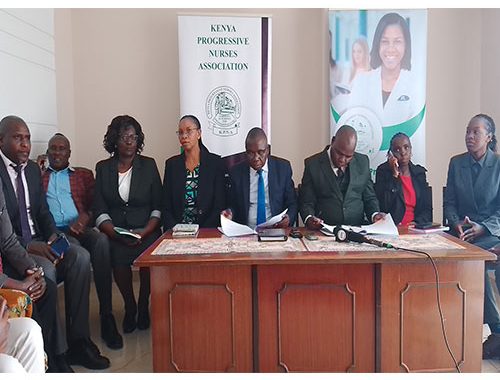The Kenyan Nurse Consultants Limited (KNCL) and the Kenya Progressive Nurses Association (KPNA) have formed a strategic relationship to enhance professional development and provide nurses with access to international career routes.
Kenya’s capital, Nairobi, hosted the meeting, which included representatives from the British Council, KNCL, and KPNA. The program aims to close training, mentorship and international opportunity gaps so Kenyan nurses can succeed domestically and outside.
The goal of the consultancy is to empower nurses by providing them with thorough training and professional guidance. KNCL, which has locations all throughout the nation, assists nurses in getting ready for professions abroad by offering study abroad referrals, brief clinical instruction in life-saving techniques and National Council Licensure Examination (NCLEX) exam coaching.
Speaking on behalf of the British Council, Stephanie Wange emphasised how crucial it is for Kenyan nurses who want to work overseas to be able to communicate in English. Before granting licenses to foreign-trained nurses, countries like the US, UK, Canada and Australia demand international English proficiency tests.
According to Wange, the collaboration will make these tests more accessible by lowering costs and streamlining logistics, enabling more nurses to get over geographical and financial obstacles. One of the most frequent barriers for nurses looking to pursue opportunities outside of Kenya is addressed by this approach.
KPNA President Michael Ngesa praised the partnership, pointing out that the organisation has historically supported professionalism, ongoing medical education and nurse mentorship. The group expects that by partnering with KNCL, professional development will become more accessible and cheap, particularly in rural regions where opportunities are few.
“It is an investment in Kenya’s healthcare system to empower nurses,” Ngesa stated, adding that “better-trained nurses result in better patient outcomes across the country.”
In order to guarantee that no nurse is left behind, he emphasised the significance of making training programs accessible and inclusive.
The company’s goal was broadened by Edwin Simiyu, CEO of KNCL, to give nurses the resources they need for jobs both domestically and abroad. He noted that Kenyan nurses who previously had to fly outside for testing now had fewer obstacles thanks to the opening of an NCLEX exam centre in Nairobi.
Simiyu underlined that the collaboration with KPNA will also shield nurses from being taken advantage of by dishonest people by providing them with a reliable and organised route from education to employment.
He pointed out that nurses will receive skills, career assistance and mentorship through diaspora support programs, decentralised training and short courses like Advanced Cardiac Life Support (ACLS) and Basic Life Support (BLS).
The CEO of KNCL went on to say that the collaboration aims to empower professionals with top-notch capabilities, bolstering Kenya’s healthcare sector in addition to enabling nurses find jobs outside.
Stakeholders pledged to carry out the stated objectives, which included clinical training, mentorship sessions and assistance with international job placement.
This collaboration shows how cooperation amongst international organisations, private consultancies and professional groups can provide answers to local and global healthcare problems. KNCL, KPNA and the British Council are building a system that empowers professionals, shields them from exploitation and fortifies Kenya’s health sector by training nurses for roles abroad while fostering their development domestically.

